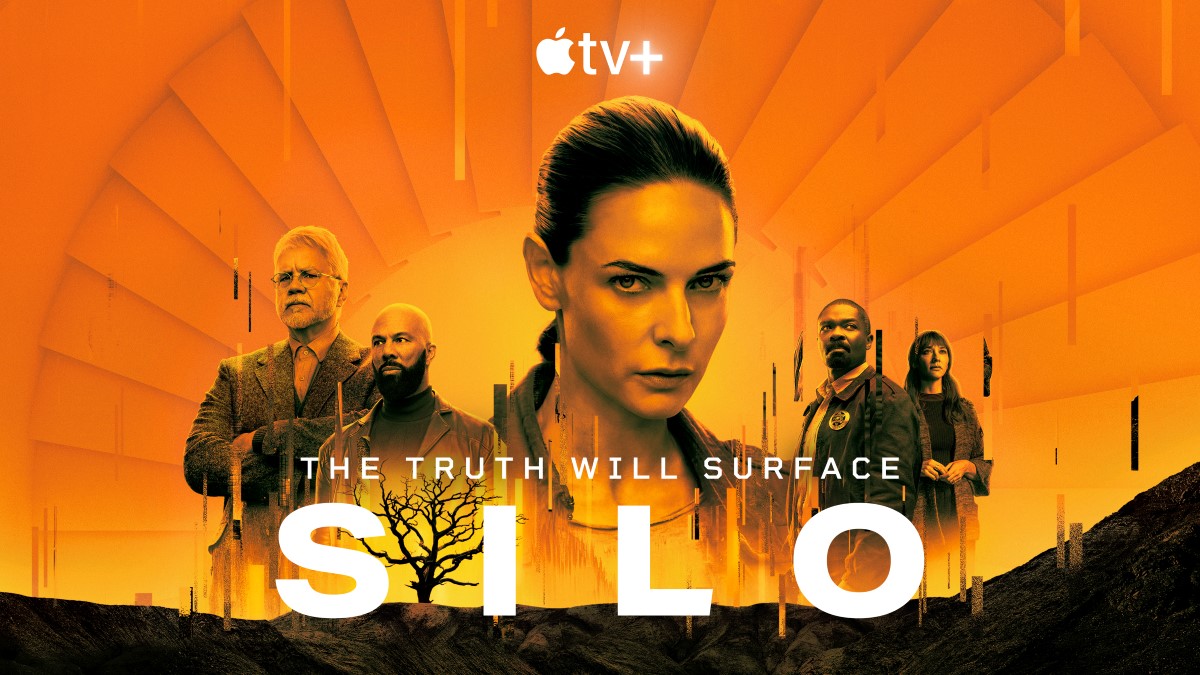Apple TV+ has taken expensive stabs at sci-fi greatness before but they've never hit their target quite as successfully as they do in the excellent "Silo," premiering with two episodes today before dropping one at a time through the next eight weeks. Based on the Wool series of books by Hugh Howey (interviewed here by our own Nell Minow), "Silo" has echoes of projects like "Blade Runner," "The Expanse," and even "The Platform," but it also has its own confident voice, a complex storytelling tone more reminiscent of literature than traditional streaming dramas. One of the many things I love about this show is that it embraces episodic structure—a lost art in the era of "my season is more like a chopped-up movie"—and these episodes play out like chapters in a book. The stunning premiere—one of my favorite first episodes in a long time—sets the stage in a way that doesn't even center on the eventual protagonist of this show. "Silo" trusts its viewers with complex themes, multiple arcs, and a shifting narrative that forces us to trust the creators too. It's great stuff.
It's also an incredibly difficult show to write about without spoiling, so I'll be as vague as possible. The premiere introduces the concept—just over 10,000 people live in a massive underground bunker known as the Silo. History has been destroyed to such a degree that the residents aren't sure how they got there or what happened to the outside world. All they know is that it's deadly outside. They can see it. Or can they? Allison (Rashida Jones) starts to hear whispers that the powers that be in the Silo are lying to its residents to keep them under control. She's scared to share these beliefs with her husband, who happens to be the Sheriff (David Oyelowo), because the Silo is a place where dissent and disagreement can be punished. And there's one immutable rule: Don't ask to leave. Anyone who asks to leave must be allowed to do so, and no one has ever returned.

Into this unique set-up, "Silo" drops many other interesting characters before centering on Juliette (Rebecca Ferguson), a different protagonist than that of the premiere. Juliette works on the mechanical floors at the bottom of the Silo, the ones that keep everything running—the writers smartly avoid a direct class system on the floors but there's a different energy in her sphere. Juliette gets involved with the lawman when he investigates a mysterious suicide, and she eventually takes over the lead before even weirder things happen in the silo. Can she trust the judicial sector run by an imposing figure named Sims (Common)? What about the creepy tech overseer (Tim Robbins) who punishes people for posting the wrong information online?
Guided by the brilliant Graham Yost ("Justified," "The Americans") and directed by Morten Tyldum ("The Imitation Game") to start, "Silo" is a remarkably confident show that refuses to hold your hand. In many ways, we are as lost and confused as the characters. We are dropped into the Silo with them, unpacking its purpose, history, regulations, and impact. Yost and his team absolutely nail this complex writing. It's thrilling to see something this confidently plotted, always a step ahead of the viewer but not far enough down the narrative path that we don't want to see what's around the next corner.
Of course, like a lot of sci-fi fiction, "Silo" has a great deal to say about the society of the people who are watching it too. It doesn't feel coincidental to watch a show about a society that's essentially impacted by a lockdown in the 2020s. And themes of control over women's bodies and control over what history we can be taught have reflections in the real world in 2023, of course. Who gets to decide what history matters? Who determines the value of knowledge? There will likely be fantastic readings of "Silo" from a religious angle—the silo being this plane of existence, with its divided narratives of how we got here in the first place, and outside being the great beyond that some believe comes when we leave it. It's a show with so much to unpack in every episode that one wishes they could engage in discussions like a great book club after every episode.

Inspired by the writing and involvement of Yost, "Silo" attracted a great cast that includes a few familiar faces I haven't even mentioned, like Iain Glen, Harriet Walter, and Will Patton—all excellent. But the show belongs to Ferguson, who imbues Juliette with just the right blend of skepticism and intelligence. She's the Ripley of this "Alien 3" enclosure—someone who has been burned before but realizes she may be needed in this current time of crisis. It's another engaging, magnetic performance from a great actress.
The abundance of characters and ideas in "Silo" can be a bit of a drawback. Over the first half of the first season screened, I almost wanted it to slow down, to explain more of what's happening in the Silo and how these power dynamics have been formed over generations. Of course, this momentum is intentional and often beneficial, but it's such a rich show that I found myself wanting to live in its world more than just trying to keep up with its plotting. Still, it's a minor complaint for a major show, one of the best of 2023 so far.
Five episodes were screened for review.












